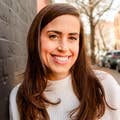Marshana Ritchie felt excited. It was 2008, and she was one of the final six contestants on the 12th season of The Bachelor, cheekily subtitled London Calling in honor of British star Matt Grant. Hometown dates were approaching, and Ritchie, the first Black woman to make it to the final six, sat with the other women discussing the possibility of introducing Grant to their parents.
“They get to me,” Ritchie told BuzzFeed News. “And one girl, in all sincerity, was like, ‘So do you know your father?’”
The callous, racist comment was only one of many Ritchie said she experienced during her weeks on the show. She got sent home soon after, never getting the chance to introduce Grant to her parents, who at the time had been married for 35 years. Still, she had made Bachelor history, making it further than any Black contestant before. It would take another nine years before the show would cast a Black lead, Rachel Lindsay, and another four before — in a surprise decision announced in the middle of the Black Lives Matter protests last year — the show would cast a Black man as the Bachelor, Matt James.
James’s season soon descended into chaos, leading the show to its own racial reckoning. Social media sleuths uncovered posts of frontrunner Rachael Kirkconnell at an antebellum South–themed party in 2018. Kirkconnell had also liked pro-Trump Instagram posts. (On Feb. 11, Kirkconnell apologized for her actions in an Instagram statement, saying they were inexcusable and wrong.)
When Lindsay, now a correspondent for Extra, interviewed longtime show host and executive producer Chris Harrison about the scandal, his steadfast defense of Kirkconnell led to an uproar among Bachelor fans. Lindsay had to temporarily suspend her Instagram account after enduring a torrent of racist abuse, and Harrison was forced to temporarily step back from the show, saying in a statement he was “so wrong” and promising to be “dedicated to getting educated on a more profound and productive level.” (On Friday, Warner Horizon and ABC Entertainment announced in a joint statement to BuzzFeed News that Harrison would not be returning as host for the next season of The Bachelorette, saying the franchise supports him "in the work that he is committed to doing." Tayshia Adams, the second Black lead, and fellow former Bachelorette Kaitlyn Bristowe will host instead.)
The disaster of James’s season has made clear what many Black fans and contestants of the franchise say has been true since the program began in 2002: The Bachelor has a race problem. The issue goes down to the root. While white contestants have been able to cause drama, pick fights and emerge with a healthy Instagram following and a ton of fans, according to Black contestants I interviewed, their appearances made them subject to harassment and abuse from fans simply for being Black on a show that, they feel, was never built to support them.
ABC Entertainment and Warner Horizon did not respond directly to a detailed list of allegations presented in this story. They referred to a statement announcing Harrison's departure.
"As we continue the dialogue around achieving greater equity and inclusion within The Bachelor franchise, we are dedicated to improving the BIPOC representation of our crew, including among the executive producer ranks," it read. "These are important steps in effecting fundamental change so that our franchise is a celebration of love that is reflective of our world."
“One girl, in all sincerity, was like, ‘So do you know your father?’”
BuzzFeed News spoke to four Black former contestants of The Bachelor spanning the entire history of the show. They weren’t difficult to find, because, for most of the show’s history, there have usually only been one or two Black castmates per season. From 2009 to 2012, there were no Black contestants at all. (Two Black men who were rejected as contestants sued for discrimination in 2012. Four Black women were cast in the following 2013 season.)
While each woman had a different experience and perspective about her time in the Bachelor mansion, common threads emerged from our conversations. The women felt they had to be perfect, biting their tongues in order to appear “good” on the show, only to face incredible levels of vitriol from the fanbase anyway. They rarely received the same opportunities, followers, and fanbase support lavished on even white “villains” of the franchise. Both on- and offscreen, these women say they have suffered for trying to bring equality to a franchise that seems to be resisting it at every turn.
“It speaks to who America is in probably one of the realest ways ever,” said Jubilee Sharpe, who appeared on the show’s 20th season. “But people don't realize it.”
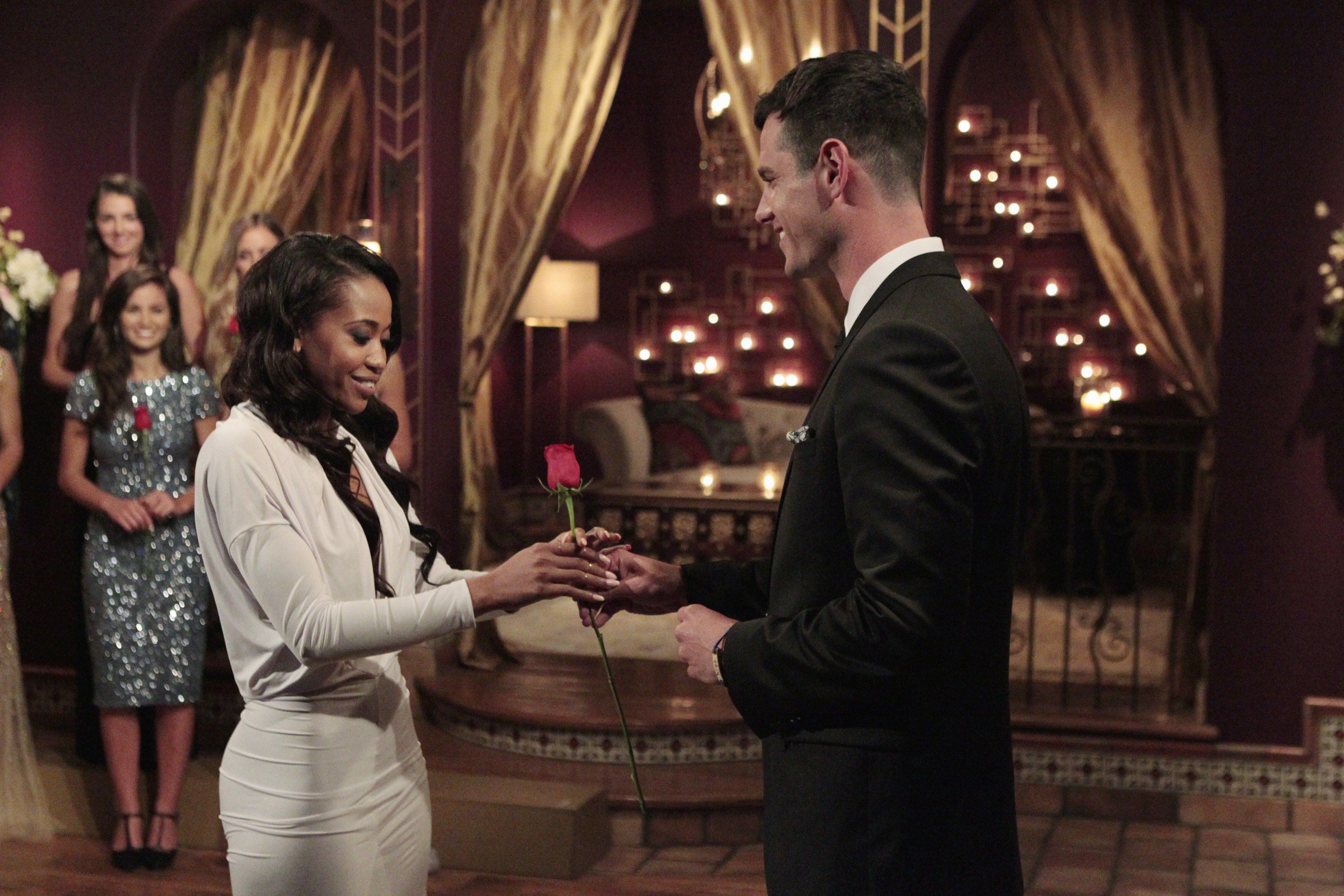
When Sharpe applied to appear on the show in 2015, she was 23 and fresh out of the US Army, where she served in Afghanistan. She now admits she has no idea what she was getting herself into, although she was used to being in predominantly white spaces. Sharpe was adopted as a child by a white family in the US after her biological family died in Haiti.
“I grew up in Oregon where I was, like, one of five Black people in my high school,” she said. “Oh, and I grew up in Montana, where I was one of two Black children within 30 miles.”
Still, when she arrived at the Bachelor mansion, her excitement soon turned into anxiety. Most of the women looked similar, with light hair and pale features. While two of the women were biracial and there were other women of color, Sharpe was the only woman who was, as she put it, “capital B Black.” Soon, Sharpe became beset by this overwhelming feeling she wasn’t supposed to be there, and she was unsure why the season’s Bachelor Ben Higgins was keeping her on the show. When Higgins would describe his feelings for her, he would call her “intriguing” (by contrast, he called his eventual pick, Lauren Bushnell, “the most beautiful woman he had ever laid eyes on”).
“I'm very intuitive. I'm like, This man is not into me. Why am I still here?” Sharpe said.
Over the course of her experience, Sharpe became plagued with extreme anxiety and self-doubt. She felt both different from anyone else and othered. While Higgins paid her attention, it wasn’t “the right kind of attention,” she said.
“I felt like a zoo animal,” she said. “I felt like an exotic zoo animal … I wasn’t like all the other animals in the zoo, so people who would ooh and aah at me, but it wasn’t … it’s fascination, like I’m the unknown.”
“I felt like a zoo animal.”
When Sharpe later watched her appearance on the show, she felt a new kind of pain. The women, who had for the most part been nice to her face, told the cameras while Sharpe was on a one-on-one date with Higgins that they hoped she didn’t return. In one infamous line, contestant Lauren Himle told the cameras why she felt Sharpe wouldn’t be a good fit for Higgins: Ben wants a wife who hangs out with “all the other soccer moms,” implying, according to Sharpe and other critics at the time, that she would not fit in with typical “soccer moms” because of her race. To Sharpe, what the other women said behind her back was “mind-blowing.”
“That hurt,” she said. “Because at that point we were all hanging out like after the show and stuff … And I'm like, Wow, I'm having to watch all this back and just had a conversation with 90% of you today.”
Microaggressions were a common complaint for Black women on the show, most of whom, like Sharpe, were the only, or one of the few, women of color in the group.
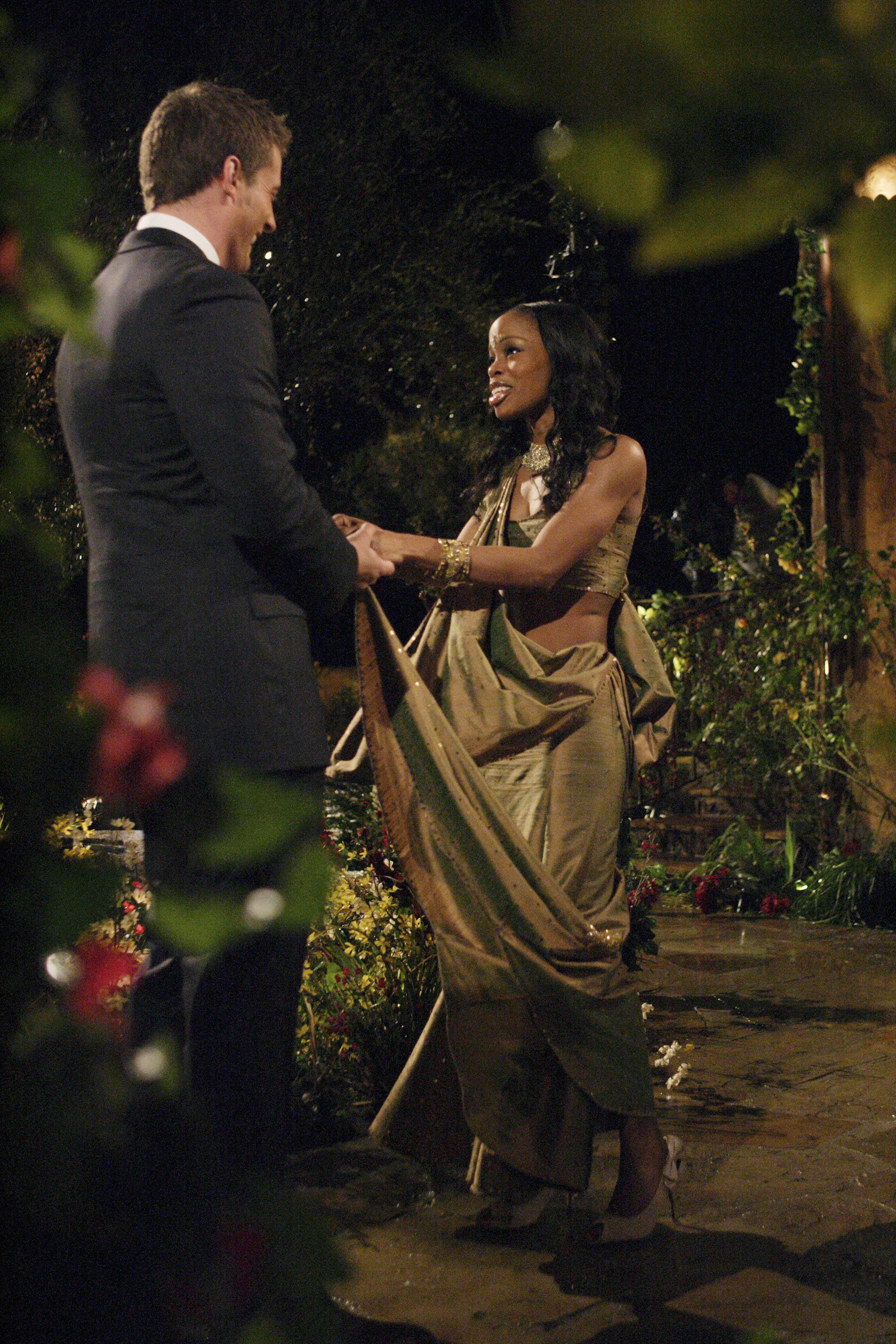
Marshana Ritchie decided to try out for the show when she was 26 because her mom loved it. Many Black people she knew couldn’t understand why she would want to go on what they called that “white show,” she said. But Ritchie thought, Why couldn’t she be on the show if she wanted? She had as much of a right to be there as anyone else.
“It’s uncomfortable to be in these spaces, but someone has to do it,” she said. “Someone had to integrate schools for the first time; someone had to integrate buses.”
But she told me actually being on the show was tough. With every week that passed, Ritchie felt she had to justify why she was still around.
“It kinda felt like a lot of the fellow contestants felt like I didn’t maybe deserve my place on the show or I didn't deserve to be as successful,” she said.
If the white contestants didn’t understand why Ritchie was still there, Ritchie has an idea why she got as far as she did.
“When news media would reach out and be like, ‘Oh, what do you attribute your success to?’ And I'm like, ‘Because my Bachelor’s British,’” she said. “If he was from Minnesota maybe not, but he’s British so I had a chance … It was kind of like a joke, but partially true.”
It got worse, she said, when Bachelor Matt Grant chose Ritchie over a white contestant, Holly Durst, during the show’s infamous two-on-one date, where two contestants go head to head for one rose. (Durst was a fan favorite who went on to marry a man she met on the spinoff show Bachelor Pad.) Ritchie felt as though the other women on the show thought she had stolen Durst’s spot.
“I don't even think they realize consciously … the perception that I was taking away something that belonged to them,” Ritchie said.
Besides the assumption that her father wasn’t in her life, Ritchie said women also asked her other strange questions, like if she had a child. These tensions culminated in a showdown between Ritchie and another contestant, Chelsea Wanstrath. The show branded it as the “most shocking confrontation in Bachelor history,” during which Wanstrath accused Ritchie of acting “like she didn’t want to be there.” In the episode, Ritchie told the cameras she was “shocked” to be called out as negative, telling Grant she rarely gets angry, but felt her character was being attacked.
Ritchie now says she felt she had to smile through those experiences, feeling deathly afraid of embarrassing not only herself and her family, but her race. She knew no one else could understand, because all the production team was white too. (ABC did not respond to our questions about the racial makeup of the show’s production team at the time.)
“I felt an immense sense of pressure to behave well because I was the only Black person on with Matt and not play into stereotypes,” she said. This distracted Ritchie from the stated purpose of the show, which is repeated ad nauseum: finding love.
“Many of the nights I couldn't spend my time deciphering if Matt was someone I could marry. I spent my time really wondering, How am I going to handle the pressure? How are the girls gonna be tomorrow? What else is gonna come at me?” she said.
“I don't even think they realize consciously … the perception that I was taking away something that belonged to them.”
Taylor Nolan, who appeared on the show in 2017, went into her season with what she calls “the most positive vibes ever.” She quickly found herself in a role she didn’t anticipate or want: the main foil to the show’s villain, Corinne Olympios.
Olympios’s antics on the show — getting naked, off-the-wall one-liners (“My heart is gold, but my vagine is platinum,” “I don't do chores"), and talking about having a nanny as an adult — led her to be dubbed the best villain by fans, or in some cases, the best contestant ever on the show.
Nolan was 22 and had just graduated with her degree in mental health counseling. According to her, many of the other women had called out Olympios’s antics, but soon grew tired of it. Nolan wanted to help Olympios, she said, but soon felt pigeonholed into being Olympios’s main adversary instead.
“I think in part it was production. I think in part I really got to her,” Nolan said of her role on the show. She grew frustrated when it seemed that her Bachelor, Nick Viall, would only talk to her about the drama with Olympios.
As the show went on, Nolan versus Olympios became a key theme, with Nolan increasingly calling out Olympios on her antics and accusing Olympios of not taking the show seriously. While several of the women confronted Olympios over things like napping at inopportune times, as the season went on it mostly became an increasingly personal feud between Nolan and Olympios. This led to Olympios accusing Nolan of bullying her, and Nolan infamously accusing Olympios of lacking the “emotional intelligence” to be in a relationship with Viall.
The whole drama culminated in a showdown in another two-on-one date, after which Nolan was sent home. During these fights, Nolan felt cognizant, as Ritchie and others were, that she didn’t have as much leeway as Olympios to do or say whatever she wanted.
“I knew if I spoke to her the way that she was speaking to me, oh my lord, that would have never, that would have never passed,” she said.
Nolan said she was stunned when she finally watched her season and realized that Olympios had been given the opportunity to spin their fights in her favor by production. (In one talking head during the “emotional intelligence” showdown, Olympios tells the cameras Nolan is calling her an idiot. “Fuck you, bitch. I know what you’re trying to say,” Olympios retorts.)
“I was essentially given this storyline and this perception from fans and from Corrine who narrated all of it, that I thought I was so much better than everybody else,” Nolan said. “I was condescending, that I was mean, that I was a bully, that I was angry, essentially...a version of an angry-Black-girl edit basically.”
Nolan was particularly struck by one of Olympios’s quips during one of their fights over whether Olympios was ready for love: “Make America Corinne Again.”
“That statement is rooted in white supremacy. That statement is rooted in racism. And whether or not Corinne was fully aware of what she was saying, I don't frankly care,” Nolan said, noting the season aired shortly after Donald Trump’s 2016 election victory. “People just thought it was funny. And I think that's what's the saddest thing to me is that, again, things like racism, people of color, Indigenous people, Black people are continuously the butt of the joke.” (ABC did not respond to requests for comment about Nolan’s accusations.)
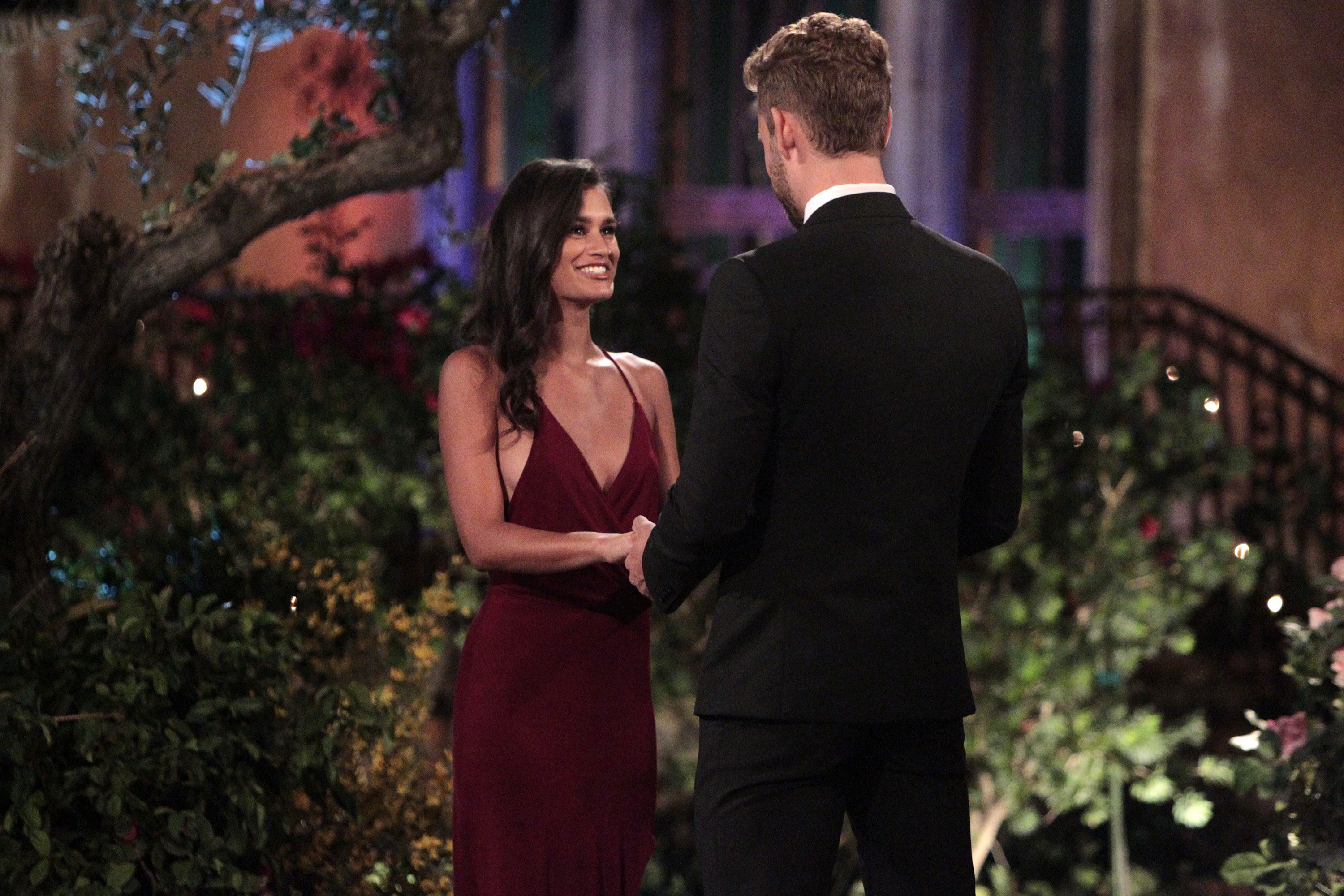
Once the show aired, Nolan said, things got worse. As Olympios reaped the benefits of her fame, soon topping nearly 800,000 followers on Instagram, Nolan dealt with racist abuse. She said she received death threats, and was called a “swamp monster” and the n-word online. A stranger reported her to the Department of Health, asking them to revoke her mental health professional license.
However, Nolan is now facing a racial reckoning of her own. After becoming one of the franchise’s most vocal critics on its failings on racial and social issues, people on Reddit dug up old tweets of Nolan’s where she made disparaging comments about Asian people, LGBTQ people, overweight people, Indian people, and Jewish people. Nolan apologized initially by blaming her actions on her own internalized racism and self-hatred, according to US Weekly, which only made the controversy grow.
In a 30-minute apology video she posted to Instagram on Feb. 28, Nolan said she got so involved in anti-racist work because of her past actions, which she said she didn’t delete from the internet to hold herself accountable.
“So, to my BIPOC community who is hurt by these things, I am sorry. I know that they were wrong then, and I know that they are wrong now. And I sincerely hope that you do see all of the work that I do today,” she said.
In a statement to BuzzFeed News following the discovery of her tweets, Nolan said she understands that “many people now perceive my outspokenness on racial equity to be hypocritical given what I said in my tweets when I was a teenager.”
“My thoughts and tweets from that time in my life were terrible,” she continued. “I was a very different person then who was struggling with internalized white supremacy, my own racial trauma and many other things. I'd like to think that unpacking those thoughts and actually doing that work over the last ten years helps me bring valuable insight and perspective to the issues at hand that might be able to help others.”
The racist vitriol from Bachelor Nation, as the franchise's fanbase is called, has been a feature of the series since the very first season in 2002, when LaNease Adams appeared on the show. At the time, reality TV was novel, and many young actors were appearing on dating shows to break into the industry.
Adams had no idea that The Bachelor would become as popular as it did when she was recruited as a contestant at age 23. While she was the only Black woman in the house, like the other women interviewed, Adams said she was used to being in mostly white spaces. Unlike the others, though, Adams said her house was full of lovely women, with little drama. She still is close to many of them nearly 20 years later, calling them “lifelong friends.”
Her photo appeared on a white supremacist website, with strangers calling her “disgusting” for dating the Bachelor.
After its premiere, The Bachelor became a sensation, leading to decades of success for Harrison and stars like Trista Sutter (then Trista Rehn), the runner-up on Adams’ season who went on to become the first Bachelorette. But Adams would see none of the positives. The rejection from the Bachelor, Alex Michel, hurt. She said she saw a lot of racist vitriol on then-nascent fan forums. Her photo appeared on a white supremacist website, with strangers calling her “disgusting” for dating the Bachelor.
The resulting fallout impacted her life for several years. She stopped acting for a while and couldn't watch the show. She said she was plagued with severe anxiety and depression, which led to self-medicating with anxiety pills.
“I ended up in the hospital, because I let everybody tell me who I was. Like, Why is this Black girl here?” she said of the online commenters. “And: You're not good enough. I was letting everybody tell me who I was. And that sent me to the hospital. So I had to realize: I got to tell myself who I am.”
In hindsight, Adams realizes the backlash she received wasn’t fair. All she was trying to do was go on a reality show, have fun, and maybe meet a cute guy. Instead, she was destroyed for it.
“You're just trying to have fun and do a dating show. But yet your character has to be torn down just because of the color of your skin, not because of something you said or because of something you did, strictly because you were born a certain race. It's like, Oh, you're not good enough,” she said.
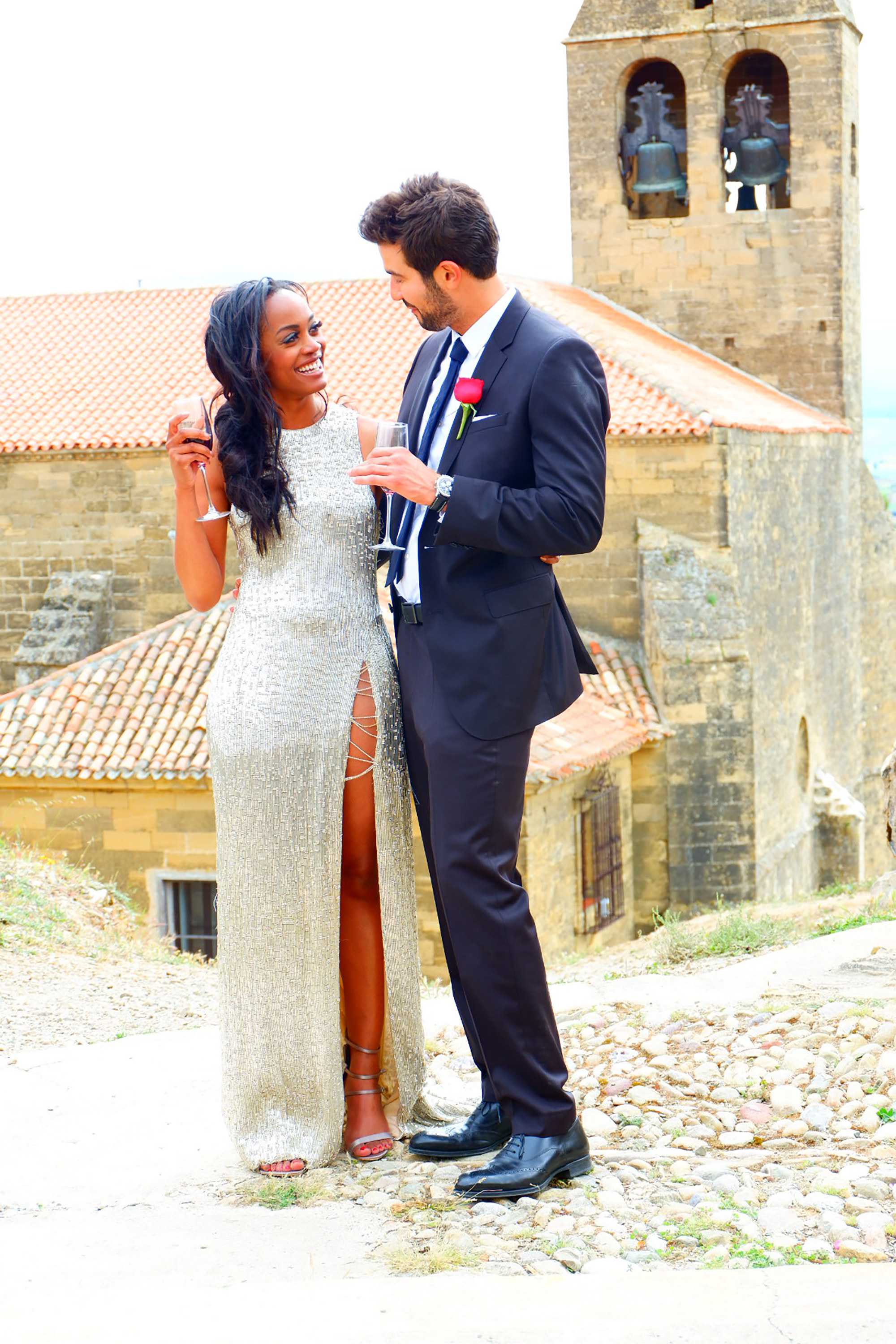
Since the Harrison debacle, ABC, The Bachelor, and its stars have been doing damage control. Matt James, the current Bachelor, put out a strong statement against Harrison’s comments to Rachel Lindsay, and Rachael Kirkconnell has apologized and asked fans to stop defending her. ABC has hired Emmanuel Acho, bestselling author and host of the YouTube series Uncomfortable Conversations With a Black Man, to host the season’s After the Final Rose special airing tonight.
Even with these attempts, the show has continued to garner criticism. After the show surprised James with his estranged father in the penultimate episode, Lindsay accused the show of playing into “disturbing” stereotypes about Black fathers.
How can the show, which Black contestants say has caused them so much pain, really continue in its current form?
“I wouldn't mind if the show were over. I wouldn't lose any sleep over it,” Sharpe said.
Even so, she shared a few positive outcomes from her time on the show, saying she learned things about herself and she is stronger now. She even went on Bachelor in Paradise and, while she still had anxiety, enjoyed herself more.
But she’s been troubled seeing the show fail to fix its issues year after year and has watched the “unacceptable behavior” grow “more and more” extreme.
“They make these statements every year … ‘we do not believe in bullying.’ And then they highlight bullying on the show. Or ‘we do not believe in racist behavior.’ Then you have a frontrunner, who is racist, on the show. So everything about what The Bachelor says that it stands for, it contradicts every season. At some point they need to be held accountable,” she said. (ABC did not respond to Sharpe’s accusations about racism.)
For Ritchie, the fact that this is how the first season with a Black Bachelor is ending is heartbreaking. Her mom, whose Bachelor fandom led her to go on the series, would have loved to see a Black man star on her favorite show. But her mom died in 2018, Ritchie said, “waiting on this change.”
“Here we are at such a pivotal moment and such a great season … and I'm a person that I celebrate change no matter how deferred or delayed it is,” she said. “And then I feel like his season is being marred, in a way, by this controversy.”
Ritchie thinks that going forward, The Bachelor needs to provide more support for Black people on the show, not only showing representation in front of the camera, but behind it. She imagines that it would have been a little easier if she had a Black person to confide in during her season, and thinks Black producers could create a show more equitable for everyone.
“We need a seat at the table. You just do. And I don't think diversity is something that only happens on camera. It needs to happen in all aspects of producing the show. This way, naturally, it will be a much more fair and balanced situation for everybody involved,” she said.
Adams thinks diversifying the show will make the franchise stronger. She said she feels like the experiences of Black women on the show have become the “elephant in the room,” swept under the rug in order to maintain the show’s happy image.
But only by acknowledging the damage that has been done, she thinks, can Bachelor Nation truly heal.
“It might be best to really just have a real conversation,” Adams said. “And who better than this franchise that has the ear of so many people?” ●
